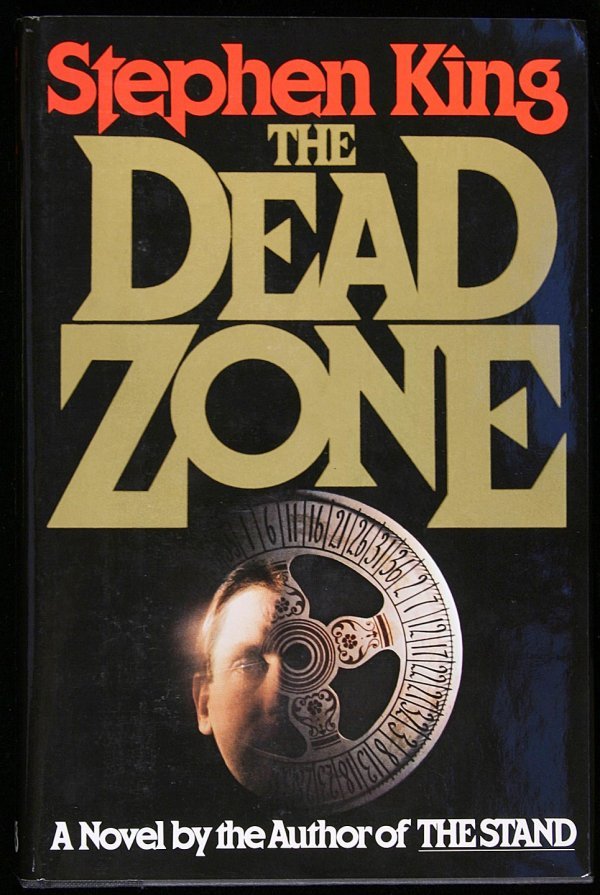Stephen King’s ‘The Dead Zone’ Redefines Horror
Brian Phillips
The cover of the book alludes to Johnny’s life put up to chance. Photo Courtesy of Brian Phillips
December 1, 2020
Stephen King is one of the most iconic writers of all time, penning classics such as The Stand, IT, and of course, The Shining. One of his novel masterpieces, The Dead Zone, revolves around a science fiction story about a man who becomes a psychic after a five-year coma. The way in which the book is written is unique to say the least, as it’s broken up into three sections, each separated by many years.
The first section starts off when the main character, Johnny Smith, suffers a significant brain injury after a skating accident in childhood and consequently begins to see little glimpses of the future. Directly after the accident, he predicts an incident that occurs a few weeks later, and these small predictions begin to occur frequently. However, these premonitions he has throughout the rest of his childhood never bother him, and he gets used to knowing what might happen. That is, until the second section of the book details events many years later. After returning from a trip with his girlfriend to the carnival, he gets into a car accident. This not only causes him to lapse into a long coma at the hospital, but it damages his brain even further, creating a zone in his brain which has died off, an area he can’t access which he calls his “Dead Zone.”
The book’s explanation for his psychic powers is that because an entire section of his brain can not function, the other portions of his brain have to work harder to compensate, which gives him the ability to see into the future. As his brain was damaged even more by the car accident, it increases the intensity of his powers, and after he wakes up from the coma five years later, he finds it close to impossible to lead a normal life. I enjoy this explanation quite a bit because it treads the line perfectly between being based in science and being based in reality, and while it makes you think, it doesn’t confuse you. To put it bluntly, it just makes sense. The method in which he visualizes the future after the coma is also excellent; he just has to touch a person, and he can see their future.
The middle of the second section is concerned with how Johnny’s parents and his girlfriend cope with his coma, especially his mother, who is one of the most complex and believable characters I have ever seen in a King novel. Before her son’s accident, she had been a religious woman, but then later plummets into insanity, devoting her entire days to prayer and becoming a lot more insufferable. While you want to hate her for all the things she says to her husband and how she treats the entire situation, you just can’t, because it’s a very real thing that could happen to anyone after massive grief. In the end, I just felt for the father more than anything, as he now had to care for his wife and cope with the almost certain loss of his son.
Once Johnny wakes up, he is informed that he’s been in the hospital for five years. After some neurological exams with his new specialist, Johnny touches him and is able to determine that the specialist’s mother, thought to have died in World War II, is alive and well. The way King writes the visions that Johnny receives is simply perfect; a bunch of words, thoughts, and ideas are italicized and laid out on the page before Johnny puts everything together, and meanwhile, the entire time, people around him are reacting in wildly different ways. Some are bewildered, some are afraid, and some are awestruck, and the cool thing is that the way King writes these scenes, it’s almost as if you are there, reacting to Johnny, amazed, right along in the book with everyone else. These are always a joy to read, especially since all the little details are collected together into a satisfying conclusion, all in just a short paragraph.
Johnny soon gets surgery and has to struggle through an intense session of physical therapy. After a sudden vision, Johnny informs his physical therapist that she left the stove on, which ends up saving her home. This is where Johnny truly becomes a hero to me, but the thing that separates him from others is that he isn’t looking for public recognition. He’s just doing what he can to help, which becomes even more apparent later on when he learns that he might not have much time left to live. Johnny is fully aware that he is living on borrowed time, and is eager to use it to its fullest potential, and these qualities are what propel him from a likable protagonist to an absolute masterpiece of character design, in my mind. He isn’t afraid of death, he’s just doing what he can with the opportunity he’s been given.
However, after a subsequently forced press conference goes wrong, Johnny is asked to help in a murder investigation. When Johnny touches the bench from the crime scene, the writing becomes incredible. King vividly describes each person that has sat there as Johnny’s mind works quickly through the ranks, looking for someone with a terrible past. Once Johnny finds them, the vision overtakes his mind, and it’s terrifying watching another person’s past thoughts possess him. He breaks down crying, terrified out of his mind afterward, and we can only imagine the horrors he had to see in order to catch the culprit. These are some of the most well written, intense paragraphs I have seen yet in a horror novel, and they directly capture the hidden, more psychological terror in the book.
While not seemingly scary at first, The Dead Zone is horrifying in a different way. Every vision that Johnny has is terrifying, and in learning to cope with this ability he can’t control, the pain projected on him so movingly transforms itself into a duty to help others before he finally passes away. The ending is one of the best I have ever read, and after I put the book down, not only did I feel sad for Johnny and his family, but I also felt complete, in the way you feel after finishing something truly excellent. This book definitely retains a spot as one of King’s best works, and I highly recommend it.



